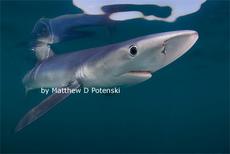|
Honolulu. 12.6.2010. Scientific recommendations for improving information on population status and fishing of sharks will be considered this week at the annual meeting of the Western and Central Pacific Fisheries Commission (WCPFC). Scientists are recommending that the WCPFC adopt a three-phase shark research plan, identify species of concern, and make reporting on shark catches mandatory.
Shark catch reporting has proved a challenge for some WCPFC member countries. Sharks are often misidentified, catches are under-reported in the fishing records of many fishing fleets, and more observers are needed for the fleets catching the most sharks.
"The status of shark populations is precarious because of their biological vulnerability, the lack of shark catch limits in most areas, and the very poor state of the data," said Shelley Clarke, a fisheries biologist and shark fisheries expert with the Oceanic Fisheries Programme of the Secretariat of the Pacific Community who will present the shark research plan to the WCPFC. "Under this plan, we are not only aiming to assess the status of shark populations, but also highlighting the urgent need for shark catch information which is vital for determining sustainable catch levels."
Sharks are taken incidentally by fishermen seeking more valuable tuna or swordfish, but are also targeted for their fins as well as their meat. The WCPFC has designated blue, mako, oceanic whitetip, thresher, and silky sharks as key species based on a combination of conservation concern and data availability. The WCPFC Scientific Committee is recommending that porbeagle sharks and four species of hammerheads be added to that list. To date, the region's only international shark population assessment is for blue sharks.
"With good reason, safeguards for sharks - particularly makos, threshers, oceanic whitetips, hammerheads, and porbeagles - are increasingly being considered by other regional fisheries bodies as well as in global wildlife forums," said Sonja Fordham, President of Shark Advocates International, a non-profit conservation group. "We encourage the WCPFC to also elevate the conservation priority of sharks, heed the advice from their scientists, and consider precautionary limits to prevent overfishing of these highly vulnerable species."
Last month, the International Commission for the Conservation of Atlantic Tunas adopted measures to protect oceanic whitetip sharks, limit fishing for hammerheads, and improve mako catch data. Proposals to list oceanic whitetip, porbeagle, and hammerhead sharks under the Convention on International Trade in Endangered Species were defeated in March 2010.
Notes to Editors: Notes to Editors:
Shelley Clarke, a specialist in shark fisheries and the shark fin trade, is Shark Assessment Scientist at the Secretariat of the Pacific Community, the Scientific Services Provider to the Western and Central Pacific Fisheries Commission.
The WCPFC is an international fisheries governing body aimed at ensuring conservation and sustainable use of highly migratory fish in the western and central Pacific Ocean. WCPFC members include Australia, China, Canada, Cook Islands, European Union, Federated States of Micronesia, Fiji, France, Japan, Kiribati, Korea, Republic of Marshall Islands, Nauru, New Zealand, Niue, Palau, Papua New Guinea, Philippines, Samoa, Solomon Islands, Chinese Taipei, Tonga, Tuvalu, United States of America, and Vanuatu. Belize, Indonesia, Senegal, Mexico, El Salvador, Ecuador, and Vietnam are cooperating non-members. Seven Territories (American Samoa, Commonwealth of the Northern Mariana Islands, French Polynesia, Guam, New Caledonia, Wallis and Futuna, and Tokelau) also participate.
The WCPFC focuses on management of fishing vessels that use longlines (fishing line with hooks set at regular intervals) and purse seine gear (large nets that surround schools of fish and cinch at the bottom, much like a drawstring of a "purse"), as well as troll lines, pole and line gear and other small scale fishing methods, including some artisanal methods.
The three-phase research plan endorsed by the Scientific Committee is aimed at assessing shark population status, coordinating research, and improving fishery statistics.
The IUCN (International Union for Conservation of Nature) classifies scalloped and great hammerhead sharks as Globally Endangered. Smooth hammerheads, porbeagles, makos, threshers, and oceanic whitetip sharks are categorized as Globally Vulnerable. Blue and silky sharks are considered Near Threatened. See: http://www.iucn.org/?3362/Third-of-open-ocean-sharks-threatened-with-extinction.
|



